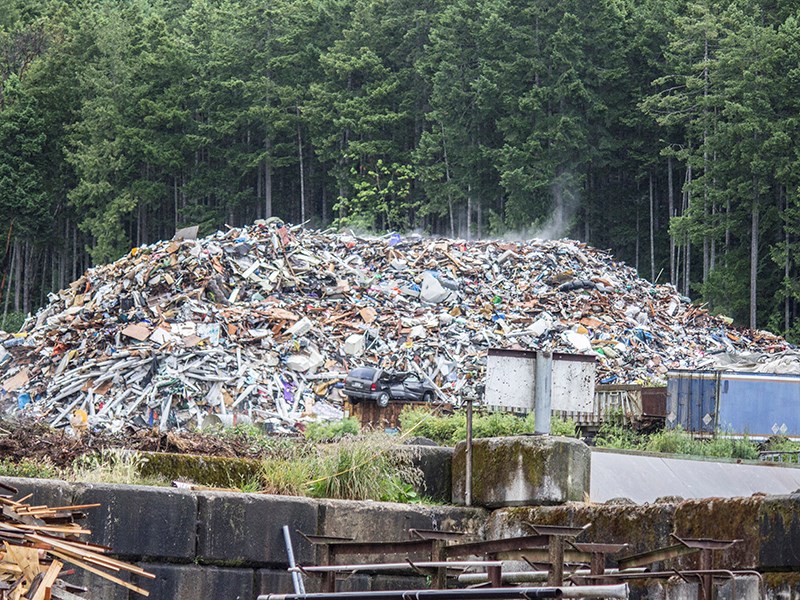A massive, growing pile of waste at Augusta Recyclers is causing residents to question what is going on at the local waste-transfer site.
Westview resident Dave Hodgins has written an open letter to City of Powell River and Powell River Regional District (PRRD) to voice his concerns about the lack of disposal of the waste and its potential impact on the surrounding environment.
“There is something going on there and it only takes someone to drive up there to look at the pile. It’s grown hugely,” said Hodgins.
Augusta owner Craig Long acknowledged that the pileup of construction and demolition waste is a community concern and he said efforts are being made to take care of it.
“As of last month, we began shipping the current flow of construction and demolition waste and stopped stockpiling in the back,” said Long, “and our plan is that by year’s end we should have all the stockpile shipped and cleaned up.”
According to Long, the pile of waste presents no threat to public safety.
“We’ve had an environmental company come in and check and there has been no impact, other than it being unsightly and hard to contain,” said Long.
Hodgins said his concerns about the site come from the fact that PRRD will be starting its solid-waste management review and if private firm Augusta does not get its contract renewed, it could have detrimental effects on the business.
“We’re paying good money to have someone take our garbage and construction waste away,” he said. “What’s going to happen if they go belly up? We already have two landfills that we haven’t cleaned up yet in Powell River.”
Hodgins said Augusta does not have the permits to create a landfill on its property, but that is, in effect, what it is doing.
Hodgins said he has not yet made a complaint to the BC Ministry of Environment and is looking for a response back from the city or the regional district.
According to Hodgins, the only municipal representative that has replied to him is city councillor Rob Southcott.
“It’s in the city’s interest, since it’s part of the regional district,” said Southcott. “I just told Hodgins ‘thanks for the letter.’ That’s all.”
City council discussed the matter at its Tuesday, June 14, committee of the whole meeting. Details were unavailable at press time.
Hodgins said that, as of press time, no one from PRRD has contacted him.
“I’ll bide my time, but if I don’t get a response, I’ll be going to the province,” he said.
Hodgins said that the buildup of construction and demolition waste began in 2011 when the scrap from the demolition of Max Cameron Secondary School was placed under millfelt at the back of the waste-transfer site. Recently, the pile has been growing at a faster pace.
“We’ll take care of it,” said Long.
PRRD manager of community services Mike Wall said an upcoming review of solid waste will do a number of things.
“It will look at and bring us up to speed on things that have happened already,” said Wall, “such as the introduction of Multi-Material BC recycling, an update with a view towards opportunities that will look at potentially repairing some things that are not working well in our current system.”
At a recent PRRD committee of the whole meeting, Hodgins’ letter was noted and filed, but directors did not comment on the matter, other than to answer questions after the meeting regarding the purpose of Augusta’s site.
“It’s not a landfill,” said PRRD Electoral Area C director Colin Palmer.
PRRD chair and Electoral Area A director Patrick Brabazon said that Augusta is a transfer station and there will be buildups over time.
“As for specifics, this is neither the place nor the time to delve into particular issues,” said Brabazon.
Palmer added that PRRD directors are limited to what they can say publicly on the matter.
“You have to understand we’re dealing with a private company here in public,” said Palmer. “We are aware of issues and we have to be very careful.”



